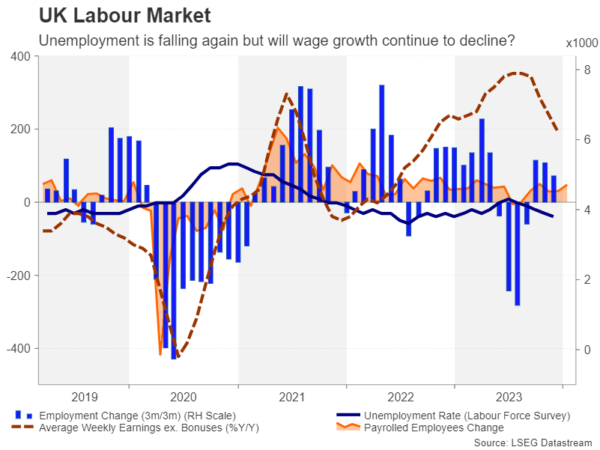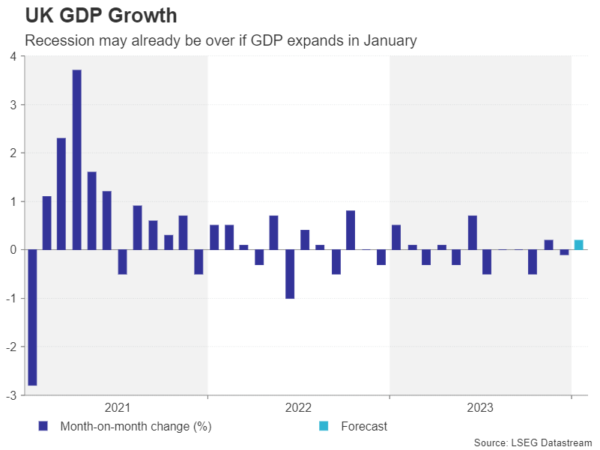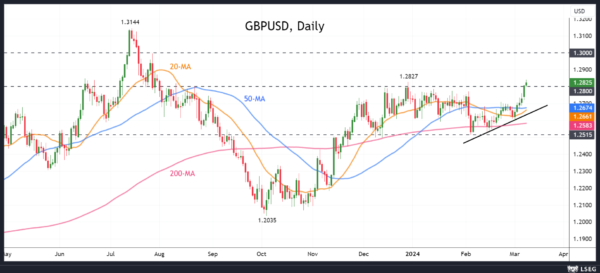- UK labour market in the spotlight as wage pressures remain elevated
- GDP data to also be watched as UK in technical recession
- Pound starts March on firmer footing, will the data support further gains?
- Employment report is due Tuesday and GDP figures on Wednesday at 07:00 GMT
Stagnation vs recession
The British economy along with Japan became the first of the major economies in the post-pandemic era to slip into a technical recession in the second half of 2023. Germany narrowly avoided one, while the United States grew at the fastest pace in two years. GDP figures are prone to significant revisions, particularly UK ones, so it’s probably not a good idea to overdo the comparisons.
However, what is clear is that growth in Europe and the UK has stagnated and politicians don’t seem to have a very strong strategy of rectifying that. Such an economic backdrop would normally be bad news for the euro and pound against the mighty US dollar, but the inflation landscape is much more identical on both sides of the Atlantic, hence, there is much less of a divergence when it comes to monetary policy.
UK labour market may be heating up again
This also solidifies inflation as the primary data driver for sterling. Nevertheless, next week’s employment numbers and GDP readings will be important in setting the mood ahead of the CPI report on March 20 and the Bank of England meeting a day later. Britain’s labour market has bounced back in recent months, with the jobless rate falling to 3.8% in the three months to December.
Further employment growth in the three months to January would suggest that an economic recovery is already underway. However, with the Office for National Statistics admitting that its employment surveys have become less reliable lately and that a fix is months away, wage growth will likely be the main focus for both investors and policymakers.
High wage growth still a problem
Average weekly earnings excluding bonuses stood at 6.2% y/y in the three months to December, having eased substantially from the high of 7.9% over the summer. A further cooldown in wage growth in January would allay concerns about persisting wage pressures.
On Wednesday, GDP data is expected to show that the UK economy grew modestly by about 0.2% in January after contracting by 0.1% m/m in December. Industrial production numbers are also due the same day.
Is $1.30 in sight for the pound?
The pound has been consolidating since late December, but the recent break above $1.28 has shifted the short-to-medium-term outlook to bullish. The next key target on the upside is the $1.30 level.
Should sterling come under pressure from weaker-than-expected data, the moving averages stand ready to defend the price from a steep fall. However, the February low of $1.2515 is the more crucial support that if broken, could tip the risks back to the downside.
In the longer term, the outlook for the pound is somewhat muddied. Inflation is likely to fall to the 2% target in the coming months as the energy price cap is lowered again. But the Bank of England expects such a drop to be short-lived and is keeping a closer watch not just on core CPI, but also on services inflation, which has started to tick up again.
Fiscal boost
Complicating matters for policymakers are the latest fiscal measures announced in the spring budget. The government cut the national insurance rate by a further two percentage points to 8%, having announced a similar reduction in the autumn statement.
The tax reductions would support greater spending by consumers, which although would be positive for economic growth, they would limit the scope for interest rate cuts by the Bank of England, and this could effectively put a floor under sterling.
For now, however, markets continue to anticipate a summer rate cut amid ongoing pessimism about the economic outlook. It’s doubtful if next week’s releases alone would significantly alter those views.



